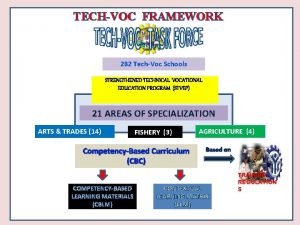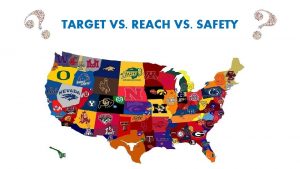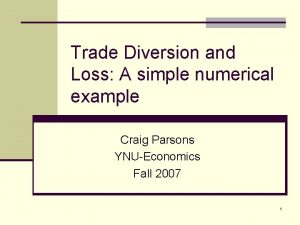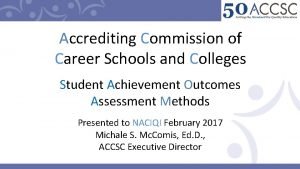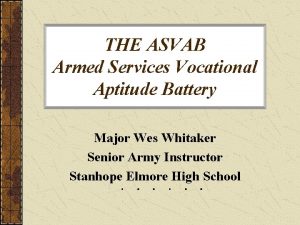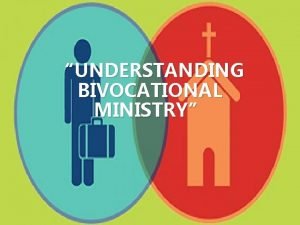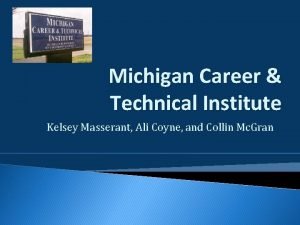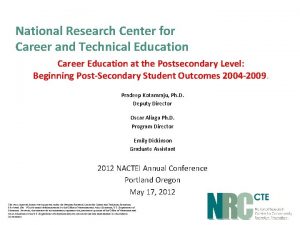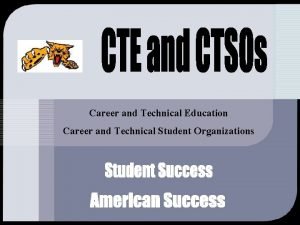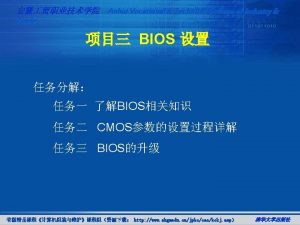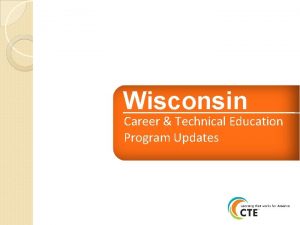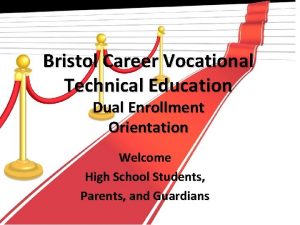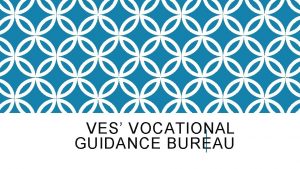Career Trade Technical and Vocational Schools Definition Career















- Slides: 15

Career, Trade, Technical, and Vocational Schools

Definition • Career, Trade, Technical, and Vocational Schools are relatively short, career-focused programs that quickly prepare students for a particular trade. • Some programs are offered at 2 -year colleges (community colleges)

Sample Programs • Heating, Ventilation and Air-conditioning (HVAC) • Plumbing • Automotive and Motorcycle Repair • Electrical Installation and Maintenance • Floral Design • Medical Assisting • Dental Assisting • Massage Therapy • Pharmacy Technician • Computer Programming • Respiratory Therapy

Advantages (Pros) • Programs typically last from 4 months to 2 years • Classes relate to the specific job you will have after graduation (no extra classes that you don’t need) • Costs less than going to a 4 -year university ($33, 000 on average for entire program) • Smaller class sizes • Hands-on learning

Disadvantages (Cons) • Credits earned at vocational schools do not typically transfer to 2 -year or 4 -year colleges. • Because this is specialized training, if you change your mind about your career, you will need to start a new program. • Limited advancement opportunities without a 4 -year degree • Can be physically demanding (working with your hands vs. your mind) • Average income is typically lower than someone with a 4 -year degree

Pay • The median pay of entry-level positions of trade jobs is $35, 720. • Bachelor degree holders make about $11, 000 more per year than those working in the trades. https: //careerschoolnow. org/careers/trade-school-vs-traditional-college

Admission Requirements • At least 16 Years old (some programs 17 years old) • High School Diploma • Some programs require acceptable SAT/ACT scores • Some programs require an entrance exam

High School Programs • Vocational courses taken with high school classes • For high school juniors or seniors

1960 Job Market (Only High School Diploma) (Vocational Schools) Source: Success in the New Economy by Brian Y. Marsh https: //vimeo. com/67277269

2018 Job Market (Vocational Schools) (Only High School Diploma) Source: Success in the New Economy by Brian Y. Marsh https: //vimeo. com/67277269

1: 2: 7 1 2 7 For every 1 job that requires a Master’s degree, there are 2 jobs that require a Bachelor’s Degree, and 7 jobs that require skilled training. Source: Success in the New Economy by Brian Y. Marsh https: //vimeo. com/67277269

Discussion Questions • Has the number of jobs requiring skilled training increased or decreased since 1960? • What do you think would happen if everybody got a four-year degree? • Is a four-year degree what all seniors should go after? Why or why not?

College Statistics • About 70% of graduating seniors will go to college immediately after high school • About 55% of students who go to a 4 year college will graduate with a degree after going to college for six years • About 30% of students who go to a 2 year college will graduate with a degree

Video https: //www. youtube. com/watch? v=4 q 6 DOLGBiaw Running Time: 2: 31

Most Popular Post-Secondary Options • 2 -year college (community college) • 4 -year college • Military • Career, Trade, Technical, and Vocational Schools Next week you will be doing a project that examines the pros and cons of each of these four post-secondary options.
 Technical vocational definition
Technical vocational definition Definition of tech-voc
Definition of tech-voc Cvschools
Cvschools Safety target reach schools
Safety target reach schools Huntsville city schools powerschool
Huntsville city schools powerschool Trade diversion and trade creation
Trade diversion and trade creation Trade diversion and trade creation
Trade diversion and trade creation Trade diversion and trade creation
Trade diversion and trade creation Trade diversion and trade creation
Trade diversion and trade creation Tramp trade software
Tramp trade software Accrediting commission of career schools and colleges
Accrediting commission of career schools and colleges Vocational service definition
Vocational service definition Afqt score
Afqt score Bi-vocational definition
Bi-vocational definition Michigan career and technical institute
Michigan career and technical institute National research center for career and technical education
National research center for career and technical education

